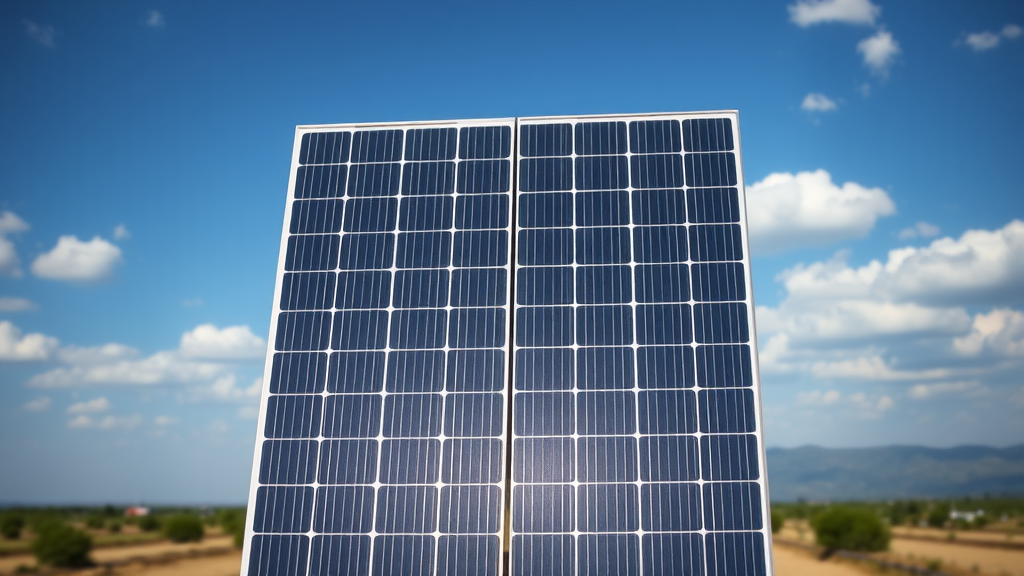Physical Address
304 North Cardinal St.
Dorchester Center, MA 02124
Physical Address
304 North Cardinal St.
Dorchester Center, MA 02124

Solar panels have revolutionized renewable energy generation, and the 300 watt solar panel represents a powerful and versatile option for both residential and commercial applications. These panels offer an impressive balance between energy output and physical dimensions, making them a popular choice for various solar installation projects.
A 300 watt solar panel typically delivers consistent power output under standard test conditions. These panels usually measure approximately 65 x 39 inches and weigh around 40-45 pounds, providing substantial energy generation capacity. Most 300 watt panels operate with the following specifications:
The actual performance of a 300 watt solar panel depends on multiple environmental and installation factors. Optimal sunlight exposure, panel orientation, and ambient temperature significantly impact energy production. Under ideal conditions, these panels can generate approximately 1.2-1.5 kilowatt-hours (kWh) of electricity per day.
Most 300 watt solar panels utilize monocrystalline or polycrystalline silicon cells. Monocrystalline panels typically offer higher efficiency and better performance in low-light conditions, while polycrystalline panels provide a more cost-effective solution.
Check out one of the top rated solar panel kits here – https://www.healthrefreshed.com/offgrid-solarkits
When planning a solar installation, consider these critical factors:
Investing in 300 watt solar panels offers significant long-term advantages. These panels can substantially reduce electricity costs and minimize carbon footprint. The average payback period ranges from 5-8 years, depending on local energy rates and installation costs.
| Panel Type | Average Efficiency | Estimated Annual Output |
|---|---|---|
| Monocrystalline 300W | 18-19% | 450-500 kWh |
| Polycrystalline 300W | 16-17% | 400-450 kWh |
Quality 300 watt solar panels typically come with 25-year performance warranties, ensuring long-term reliability. Regular cleaning and professional inspection can help maintain optimal panel performance and extend their operational lifespan.
For more detailed information about solar panel technologies, consider exploring these authoritative sources:
Check out one of the top rated solar panel kits here – https://www.healthrefreshed.com/offgrid-solarkits
Selecting the right 300 watt solar panel requires careful evaluation of your specific energy needs, budget, and installation environment. Consulting with professional solar installers can provide personalized guidance tailored to your unique requirements.
A 300 watt solar panel represents a sweet spot in solar technology, providing substantial power generation while maintaining reasonable size and weight. These panels typically measure around 65 inches by 39 inches and can generate significant electricity under optimal conditions. They’re particularly effective for homeowners and businesses looking to reduce energy costs and minimize carbon footprints.
Homeowners can leverage 300 watt solar panels to power multiple household appliances. A typical residential installation might include:
• Refrigerators
• Lighting systems
• Television and entertainment devices
• Small kitchen appliances
• Home office equipment
For remote locations without traditional electricity infrastructure, 300 watt solar panels offer exceptional reliability. They’re ideal for:
• Cabin power systems
• Agricultural equipment
• Remote monitoring stations
• Communication infrastructure
• Emergency backup power
| Parameter | Specification |
|---|---|
| Maximum Power Output | 300 watts |
| Voltage | 24-36 volts |
| Typical Efficiency | 17-22% |
Successful solar panel deployment requires careful planning. Key factors include:
• Optimal roof angle
• Sunlight exposure
• Structural integrity
• Local weather conditions
• Electrical system compatibility
Proper panel positioning maximizes energy generation. Professionals recommend:
• South-facing orientation
• 30-45 degree tilt
• Minimal shading
• Regular cleaning and maintenance
While initial installation costs might seem substantial, 300 watt solar panels offer long-term financial benefits. Average payback periods range from 5-10 years, depending on local electricity rates and solar incentives.
Potential buyers should evaluate:
• Manufacturer warranties
• Panel durability
• Technological advancements
• Local solar incentive programs
For further information, explore these reliable sources:
• U.S. Department of Energy Solar Resources
• National Renewable Energy Laboratory
• Solar Energy Industries Association
Investing in 300 watt solar panels represents a forward-thinking approach to sustainable energy. By understanding their capabilities and implementing strategic installation techniques, users can maximize renewable energy potential while contributing to environmental conservation.
Solar innovation continues to transform how we harness renewable energy, and 300 watt solar panels represent a pivotal technology in this sustainable journey. These powerful panels offer an exceptional balance between efficiency, affordability, and versatility for both residential and commercial applications. Whether you’re looking to reduce electricity costs, minimize carbon footprints, or create independent power systems, 300 watt solar panels provide a robust solution that meets diverse energy needs.
The technical specifications and performance metrics we’ve explored demonstrate that these panels are not just about generating electricity, but about smart, strategic energy production. Their adaptability means homeowners, RV enthusiasts, and off-grid pioneers can customize solar solutions that precisely match their power requirements.
Key takeaways underscore the importance of careful installation, understanding system compatibility, and strategic panel placement. Investing in 300 watt solar panels isn’t merely a purchase—it’s a commitment to sustainable living and long-term energy independence. As solar technology continues advancing, these panels represent a critical stepping stone towards more efficient, environmentally responsible power generation.
By selecting high-quality 300 watt solar panels and implementing them thoughtfully, users can significantly reduce electricity expenses while contributing to global renewable energy efforts. The future of clean energy is bright, and these panels are illuminating the path forward, one watt at a time.
Check out one of the top rated solar panel kits here – https://www.healthrefreshed.com/offgrid-solarkits